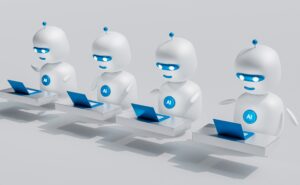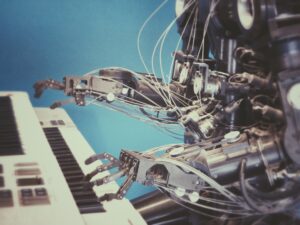
In the dynamic realm of technology, artificial intelligence (AI) stands as a transformative force, revolutionizing industries, reshaping the job market, and redefining the very nature of work. While AI may displace specific tasks and roles, it simultaneously ushers in new opportunities and career paths, propelling the future of work toward uncharted territories. This article delves into the intricate landscape of the AI-driven job market, exploring key trends, identifying promising career avenues, and providing insights for navigating this ever-evolving landscape.
1. AI-Powered Jobs: A Realm of Possibilities
The permeation of AI across various industries has given rise to a diverse spectrum of AI-powered jobs, each demanding unique skills and expertise. These roles span multiple domains, from the intricacies of data science and machine learning to the ethical considerations of AI development and the complexities of human-AI collaboration.
Machine Learning Engineers: At the forefront of AI innovation, machine learning engineers design, develop, and implement sophisticated algorithms to tackle complex problems and extract meaningful insights from vast datasets. They deeply understand machine learning principles, programming languages, and statistical techniques.
Data Scientists: As the architects of knowledge discovery, data scientists meticulously collect, analyze, and interpret large volumes of data to uncover hidden patterns, trends, and correlations. They possess expertise in data mining, statistical analysis, and visualization techniques, transforming raw data into actionable insights that drive informed decision-making.
AI Ethics Specialists: Regarding ethical issues with AI, specialists in AI ethics are vital. They ensure AI systems are developed and used responsibly, without bias, and transparently. They address issues such as algorithmic bias, data privacy, and the potential misuse of AI, safeguarding societal values and ethical principles.
AI Solution Architects: As experts in AI integration, AI solution architects create and implement AI solutions that match a company’s goals and solve particular problems. They comprehensively understand AI technologies, business processes, and strategic objectives, bridging the gap between technological advancements and real-world applications.
AI Human-Computer Interaction Specialists: At the intersection of technology and human experience, AI human-computer interaction specialists design and develop AI interfaces that are user-friendly, intuitive, and engaging. They possess expertise in user-centered design principles, human-computer interaction frameworks, and AI-powered communication strategies.
2. Artifical Intelligence Skills: The Currency of the Future

As AI continues to permeate various industries, the demand for AI skills is skyrocketing. Companies seek people who know much about machine learning, natural language processing, and AI technologies. These skills are becoming increasingly valuable and are expected to be in high demand for years.
Machine Learning: Machine learning methods like supervised, unsupervised, and reinforcement learning are crucial for creating AI algorithms that learn from data and make predictions or decisions.
Natural Language Processing (NLP): Understanding and manipulating natural language is crucial for building AI systems that can communicate with humans, extract meaning from text, and generate human-quality language.
Computer Vision: Enabling machines to interpret and understand visual information is essential for developing AI applications in image recognition, object detection, and autonomous vehicles.
3. AI Education: Equipping the Workforce for the Future
The surge in demand for AI skills has prompted a proliferation of AI education and training programs. Universities, colleges, and online learning platforms offer various courses, certifications, and boot camps to equip individuals with the knowledge and skills necessary to thrive in the AI-driven job market.
Master’s Programs in AI: These programs provide in-depth theoretical and practical training in AI concepts, algorithms, and applications, preparing individuals for advanced roles in AI research, development, and deployment.
AI Certifications: Industry-recognized certifications, such as the Certified Machine Learning Engineer (CMLE) certification, demonstrate an individual’s proficiency in specific AI domains and enhance their employability.
AI Bootcamp: Intensive, hands-on boot camps provide accelerated training in Artificial intelligence technologies, enabling individuals to acquire the skills needed for entry-level AI positions quickly.
4. Artificial Intelligence Career Paths: Diverse Opportunities Await

The future of AI work presents many diverse and promising career paths for individuals with the necessary skills and aptitude. Individuals can pursue careers in various industries, including healthcare, finance, technology, manufacturing, and retail. They can also specialize in specific areas of AI, such as robotics, autonomous vehicles, or AI-powered marketing.
Healthcare: AI is revolutionizing healthcare, from assisting in medical diagnosis to developing personalized treatment plans. AI specialists can contribute to this transformation in roles such as AI-powered clinical decision support specialists and AI-driven drug discovery scientists.
Finance: It is transforming the financial sector, from automating risk assessments to predicting market trends. AI specialists can pursue careers in diverse areas.
5. AI Salary Trends: Rewarding Career Prospects
The demand for AI skills in the job market has led to higher salaries for AI professionals. Data shows that AI engineers, data scientists, and other AI specialists are among today’s highest-paid tech professionals. This trend will continue as AI becomes increasingly integrated into business processes.
According to the 2023 Robert Half Salary Guide, median salaries for AI professionals include the following:
- Machine Learning Engineer: $125,000
- Data Scientist: $130,000
- AI Ethics Specialist: $110,000
- AI Solution Architect: $140,000
- AI Human-Computer Interaction Specialist: $100,000
These salaries reflect the high value placed on AI skills and the increasing demand for AI expertise.
AI experts can anticipate higher salaries as AI keeps changing industries and creating new job opportunities.
6. Artificial Intelligence Job Market Forecast: A Promising Outlook
The job market for AI professionals is expected to increase in the coming years.
The Labor Statistics Bureau predicts a 33% job growth in AI-related fields from 2020 to 2030, faster than average.
Several factors drive this growth, including the increasing adoption of AI technologies, the growing demand for AI-powered solutions, and the shortage of skilled Artificial Intelligence professionals. As a result, there is a strong demand for AI professionals across various industries and sectors.
7. AI Ethics: Ensuring Responsible AI Development

As AI gets more substantial and more common, worries about its ethics are increasing. AI ethics experts ensure AI systems are made and used responsibly, without bias, and openly. They address issues such as algorithmic bias, data privacy, and the potential misuse of AI.
Algorithmic Bias: AI algorithms can be biased if trained on personal data. AI ethics specialists work to identify and mitigate algorithmic bias to ensure that AI systems are fair and unbiased.
Data Privacy: AI systems frequently gather and process enormous amounts of data, causing worries about keeping that data private. AI ethics specialists develop guidelines and protocols to protect data privacy and ensure data is used responsibly.
Potential Misuse of AI: AI could be misused if it falls into the wrong hands. AI ethics specialists work to develop safeguards and regulations to prevent the misuse of AI and promote its responsible development.
8. Artificial Intelligence Impact on Society: Shaping the Future
AI is not only transforming the job market but also shaping the future of society. AI-powered technologies are revolutionizing healthcare, education, transportation, and other sectors, bringing about significant societal changes. We must consider AI’s ethical and social implications as we move forward.
Healthcare: AI improves disease diagnosis, treatment planning, and drug discovery. It also enables personalized medicine and remote patient monitoring.
Education: AI provides personalized learning experiences, automates repetitive tasks, and enables adaptive learning systems.
Transportation: AI powers self-driving cars, optimizes traffic flow, and improves public transportation efficiency.
These examples illustrate the profound impact AI is having on society. It’s vital to think about AI’s ethical and social effects as we use it in different parts of our lives.
9. Preparing for the Future of Work in Artificial Intelligence

To thrive in the future of AI work, individuals should develop a combination of technical skills, soft skills, and critical thinking abilities. Technical skills like programming, data analysis, and machine learning are essential for building and working with AI systems.
Essential skills like communication, teamwork, and problem-solving are crucial for handling the challenges of AI projects. Critical thinking abilities are necessary to evaluate the ethical implications of AI and make informed decisions about its use.
i. Technical Skills
- Programming Languages: Python, R, C++, Java
- Data Analysis: Data mining, statistical analysis, and data visualization.
- Machine Learning: It includes Supervised learning, unsupervised learning, and reinforcement learning.
- Natural Language Processing (NLP): Text analysis, sentiment analysis, and machine translation.
- Computer Vision: Image recognition, object detection, and video analysis.
ii. Soft Skills:
- Communication: Convey technical concepts to both technical and non-technical audiences
- Collaboration: Work effectively with teams of diverse expertise
- Problem-Solving: Identify and solve complex problems using AI techniques
- Creativity: Approach challenges with innovative solutions and adapt to new technologies
- Continuous Learning: Stay up-to-date with the latest Artificial intelligence advancements and trends
iii. Critical Thinking Abilities:
- Evaluate Ethical Implications: Assess the ethical considerations of AI applications.
- Identify Algorithmic Bias: Recognize and mitigate potential biases in AI algorithms.
- Consider Social Impact: Understand the broader societal implications of AI
- Make Informed Decisions: Apply critical thinking to make responsible decisions about AI development and deployment
10. Resources for Skill Development
Online Courses: Coursera, edX, Udacity
Bootcamps: General Assembly, Fullstack Academy, Thinkful
Master’s Programs: Artificial Intelligence, Computer Science, Data Science
Professional Certifications: Certified Machine Learning Engineer (CMLE), Certified Data Scientist (CDS)
Industry Events and Conferences: AI conferences, workshops, meetups
Conclusion
The future of work in AI presents a dynamic and promising landscape for individuals with the necessary skills, adaptability, and ethical awareness. By embracing Artificial intelligence and equipping themselves with the relevant technical expertise, soft skills, and critical thinking abilities, individuals can position themselves for success in this rapidly evolving field and contribute to AI’s responsible and transformative power.

Pingback: How AI is Revolutionizing Early Disease Detection?
Pingback: tadalafil